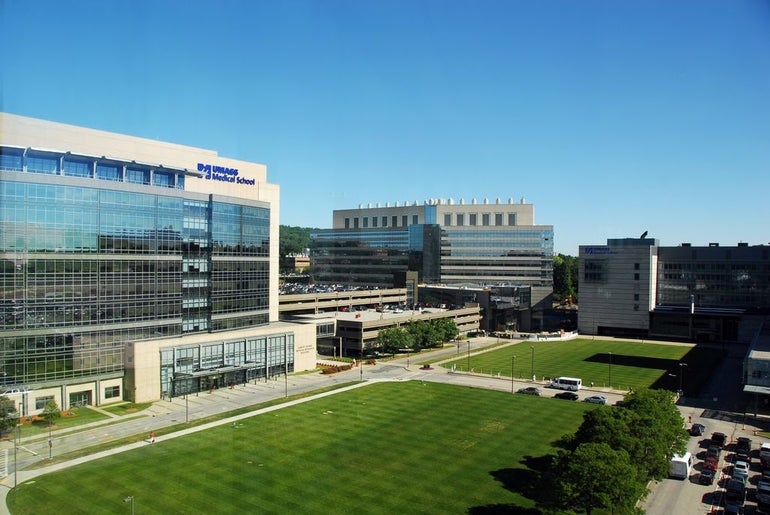Medical School: Property Taxes Likely A 'Non-Issue'
 Edd Cote
UMass Medical School
Edd Cote
UMass Medical School
Five days after it purchased three biotech office buildings adjacent to its campus for more than $40 million, UMass Medical School (UMMS) issued a lengthy response Tuesday evening to Worcester officials concerned the purchase could result in a $1.5-million tax hit to the city.
The school said in a statement, released by spokesman Mark Shelton, that it plans to market and lease available space in the buildings – which total 300,000 square feet of space – to commercial life science tenants. That means the city could collect a potentially substantial portion of the property taxes, depending on how the leasing effort goes.
UMMS said that although it was prohibited from discussing the sale negotiations ahead of time with the city, its plan all along has been to "work with the city in the coming months on a mutually satisfactory outcome that fits our shared circumstances."
"We plan on having additional successful biotech businesses operating in the park, not fewer," the school said. "In fact, more than 50 percent of the space in these three buildings is currently leased to taxable businesses."
Commercial entities are leasing just over half the space, UMass has about one-third of the space and about 10 percent is vacant.
But the seller, Alexandria Real Estate Equities, said Tuesday that the vacancy rate was expected to climb to near 50 percent later this year when Quest Diagnostics and UMass move some operations out of the biotech park.
UMMS argues that it purchased the buildings to "stabilize an important research and economic development asset for the region."
The alternative, the school said, was for the properties to become underutilized.
The statement from the school came as the city council was discussing the matter at its regularly scheduled meeting Tuesday.
City Manager Michael V. O'Brien said he met Monday with Dr. Michael Collins, chancellor of the medical school, to discuss the acquisitions.
He said Collins told him the school saw that Alexandria was not willing to invest in upgrades to the property to better market it, so it saw an opportunity to do so itself.
"They're mission-driven, so you have to respect that," O'Brien said. "We're obviously mission-driven as well."
The manager described the current market for attracting life sciences companies as "dog eat dog," and said property owners in the Interstate 495 and Route 128 belts are "giving away" space to attract long-term leases.
He hopes the city work with UMMS on potential tax incentives to attract commercial tenants.
"We will certainly commit to work with them side by side," he said.
Councilor Joseph O'Brien said he'd like to better understand the history behind the development of the biotech park and its tax history as well as what public funding went into it.
The acquisitions will be analyzed at the state level, too, it turns out.
Mayor Joseph Petty read aloud a letter at the council from Sen. Michael O. Moore requesting city officials' attendance at an oversight hearing of the Joint Committee on Higher Education to analyze the impact of the purchases.
(CORRECTION: The original version of this story misidentified Mayor Joseph Petty.)
Read more
UMass Medical School Buys 3 Biotech Buildings In $40M Deal
UMass Medical Purchase Highlights Twists Of Non-Profit Ownership









0 Comments